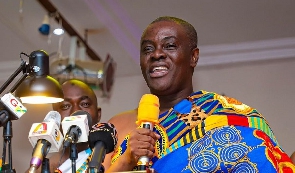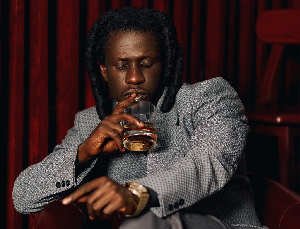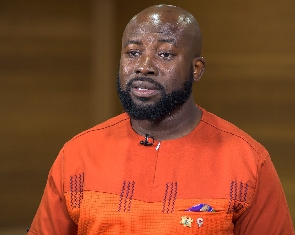We cannot stand accused of harbouring risible and inborn predilection for strongly condemning the Dormaahene’s puzzling appeal to President Akufo-Addo and the Attorney-General, Godfred Dame to discontinue the trial of the elected Member of Parliament for the Assin North Constituency, James Gyakye Quayson.
We are all equal before the law, so why must some selected people in society have some kind of immunity in the justice delivery?
“No heart, no conscience, no empathy – guys, why haven’t you gone into politics?” says a cartoon of Dorothy chatting to the tin man, the scarecrow, and the lion.
Apparently the parliamentary privilege was never intended to help parliamentarians escape the criminal law, but it was rather inserted in the constitution to give parliamentarians immunity against needless civil suits for defamation whilst undertaking their parliamentary duties.
It is however important to note that the provision was taken from the British parliamentary privilege and transposed and given meaning in Ghana’s constitution.
The crucial question then is: do the originators of the controversial provision still find it prudent and expedient?
Interestingly, a few years ago, three Labour MPs in the United Kingdom were charged with false accounting over their parliamentary expenses claims. However, they deny the offences and tried to avoid a criminal trial by invoking the 1689 Bill of Rights which gives oxygen to parliamentary privilege.
Suffice it to stress that the parliamentary privilege stops MPs and peers from being sued for defamation. So how on earth then would the MPs try to invoke parliamentary privilege in criminal prosecutions under the Theft Act?
Apparently, they were seeking to hide behind the parliamentary privilege, which in my view, was an abuse of the privilege.
But despite their refuge in the parliamentary privilege, the judge found them guilty and sentenced them into prison. Their sentences ranged from 18 months to 12 months.
It is worth noting that the modern understanding of parliamentary privilege relates to immunity from litigation for words spoken in the House of Commons. And more so it has a wider historical meaning, encapsulated in the evolution of British constitution which can be open to legal interpretation.
The origins of parliamentary privilege
The parliamentary privilege can be traced back to the English Civil War when Parliament was fighting for the right to self-governance and independence from the monarchy. However, it was not until 1689 when the Bill of Rights established the rights of parliament after the so-called Glorious Revolution that it became enshrined in law.
Take, for example, Article 9 of the Bill of Rights states that "the freedom of speech and debates or proceedings in parliament ought not to be impeached or questioned in any court or place out of Parliament".
Back then, the law was subject to the whims and caprices of the King. Suffice it to state that it was the interference from the sovereign that Parliament sought to rid itself. Parliament held MPs to account by its own strict laws which ran side by side with the criminal and civil courts. Needless to stress that back then, the rule of parliament was absolute.
Are the rules of parliamentary privilege changed?
Apparently, the twilight of the monarchy allowed Parliament to surrender some of its jurisdiction to the courts. Consequently, MPs accused of criminal offences are no longer dealt with by the authorities of the House of Commons and instead face the full force of the law.
Take, for example, since 1979, not less than 10 MPs have been sent to prison, usually for not paying fines incurred when they were conducting political protests in Northern Ireland.
Nevertheless, parliamentary privilege still grants MPs immunity from being arrested on civil matters within the grounds of the Palace of Westminster.
Let us be honest, it is a step in the right direction to protect parliamentarians whilst going through their normal day-to-day activities at the Parliament.
A few years ago, the MP, Damian Green, was arrested by the London Metropolitan Police at his constituency home on suspicion of "aiding and abetting misconduct in public office" and "conspiring to commit misconduct in a public office".
However, after the MP Damian’s arrest in December 2008, the Speaker of Parliament back then, Michael Martin, explained his actions to the Commons, telling MPs that parliamentary privilege has never prevented the operation of the criminal law.
He alluded to the Joint Committee on Parliamentary Privilege which in its report in 1999, said that the precincts of the House are not and should not be "a haven from the law (Source: independent.co.uk).”
We should, however, not lose sight of the fact that in most jurisdictions, the laws are administered equitably. Indeed, everyone could face the laws without any recourse to their status in society.
Take, for example, a few years ago, the Pakistani Prime Minister, Nawaz Sharif, was forced to resign following his disqualification from office by the country’s top court.
The Supreme Court of Pakistan dismissed Mr Sharif after a damning corruption probe into his family wealth.
The investigative panel claimed his family was unable to account for its vast wealth, leading to the court to order a criminal investigation (guardian.co.uk, 28/07/2017).
In another instance, former Brazilian president, Luiz Inacio Lula Da Silva, who had been cited as the most famous president in Brazil’s contemporary history, was sentenced to nine years and six months in jail after being found guilty on corruption and money-laundering charges (Source: guardian.co.uk, 12/07/2017).
What is more, the controversial South Korean president, Park Geun-hye, found herself in a wide-ranging corruption and cronyism scandal, which culminated in her removal from office in March 2017.
President Park Geun-hye and her long- time confidante, Choi Soon-sil, were accused of conspiring to pressure companies, including Samsung, to donate large sums of money to two non-profit foundations set up by Choi.
Choi was accused of using the money for personal gain, which she denied. However President Park admitted behaving “naively”, but denied coercing companies.
President Park was also accused of giving Choi an unlawful access to state affairs and allowing her to influence policy, including Seoul’s stance on North Korea’s nuclear weapons programme (The Guardian 2017).
In sum, the parliamentary privilege is archaic and inequitable, so let us do away with it. Let us amend or expunge the seemingly irrational provision and replace it with innovative and expedient law.
K. Badu, UK.
k.badu2011@gmail.com
Opinions of Wednesday, 5 July 2023
Columnist: Kwaku Badu















